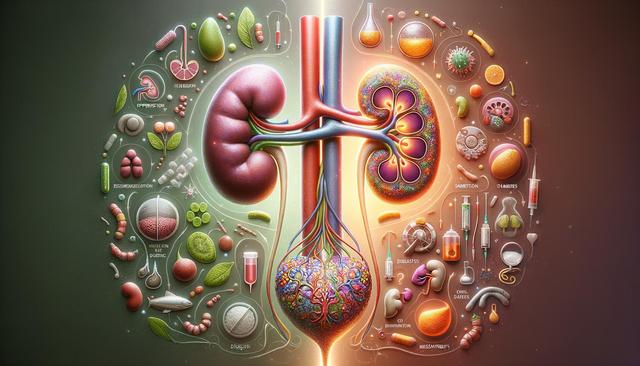What Is Kidney Disease?
Kidney disease, also known as renal disease, refers to any condition that affects the function of the kidneys. These vital organs are responsible for filtering waste and excess fluids from the blood, maintaining a healthy balance of electrolytes, and regulating blood pressure. Kidney disease often develops slowly over time and may not show symptoms in its early stages. Chronic kidney disease (CKD) is the most common form and typically results from conditions like diabetes or high blood pressure. If left untreated, CKD can progress to kidney failure, requiring dialysis or a transplant.
There are two main types of kidney disease:
- Acute kidney injury (AKI), which develops suddenly and is often reversible with prompt treatment.
- Chronic kidney disease (CKD), which occurs gradually and may lead to permanent kidney damage.
Early diagnosis and intervention are crucial in slowing the progression of CKD and preserving kidney function.
The Five Stages of Kidney Disease
Chronic kidney disease is categorized into five stages, based on the glomerular filtration rate (GFR), which measures how efficiently the kidneys are filtering blood. Understanding these stages helps healthcare providers tailor treatment plans and monitor disease progression.
- Stage 1: Normal or high GFR (90 mL/min or more) with signs of kidney damage such as protein in the urine.
- Stage 2: Mild decrease in GFR (60–89 mL/min) with continued signs of kidney damage.
- Stage 3: Moderate decrease in GFR (30–59 mL/min), often accompanied by symptoms like fatigue and swelling.
- Stage 4: Severe decrease in GFR (15–29 mL/min), indicating advanced kidney damage.
- Stage 5: Kidney failure (GFR below 15 mL/min), where dialysis or a transplant becomes necessary.
Regular monitoring through blood and urine tests is essential to detect changes in kidney function and to implement timely interventions.
Common Symptoms of Kidney Disease
Kidney disease may not cause noticeable symptoms in its early stages, which is why routine screening is important, especially for individuals with risk factors. As the disease progresses, common symptoms include:
- Fatigue and weakness
- Swelling in the hands, feet, or face due to fluid retention
- Changes in urination patterns, such as foamy urine or increased frequency
- Shortness of breath
- Persistent itching
- High blood pressure that is difficult to control
These symptoms can be related to other health issues, so it’s important to consult a healthcare provider for proper evaluation. Early detection can lead to more effective management and better outcomes.
Causes and Risk Factors
Several factors increase the risk of developing kidney disease. The most common causes include:
- Diabetes: High blood sugar can damage the small vessels in the kidneys, reducing their filtering ability.
- High blood pressure: Increased pressure in the arteries can harm kidney tissues over time.
- Glomerulonephritis: Inflammation of the kidney’s filtering units.
- Polycystic kidney disease: A genetic disorder causing cysts in the kidneys.
- Long-term use of certain medications: Such as non-steroidal anti-inflammatory drugs (NSAIDs).
Other risk factors include a family history of kidney disease, smoking, obesity, and being over the age of 60. Managing these risks through lifestyle changes and regular check-ups can help prevent or delay the onset of kidney problems.
Treatment Options and Lifestyle Management
Treatment for kidney disease depends on the stage and underlying cause. In early stages, the focus is on controlling contributing conditions such as high blood pressure and diabetes. This may involve:
- Medications to regulate blood pressure, blood sugar, and cholesterol
- Dietary changes, including reduced salt, protein, and phosphorus intake
- Regular physical activity and weight management
- Smoking cessation and limiting alcohol intake
For advanced stages, more intensive treatments may be required:
- Dialysis: A medical procedure that removes waste and excess fluids when the kidneys can no longer function adequately.
- Kidney transplant: A surgical procedure to replace the diseased kidney with a healthy one from a donor.
Working closely with a healthcare provider and possibly a nephrologist can help patients navigate their treatment options and improve their quality of life.
Conclusion: Early Awareness Leads to Better Outcomes
Understanding the stages, symptoms, and causes of kidney disease is a critical step toward managing this serious condition. Regular screenings, especially for those at higher risk, can help identify problems early when they are most treatable. By adopting a healthy lifestyle and staying informed about treatment options, individuals can take proactive steps to protect their kidney health and maintain overall well-being. If you have any concerns about your kidney function, consult a medical professional for personalized guidance and support.


